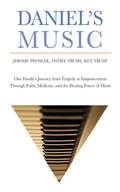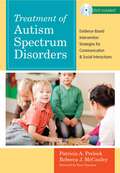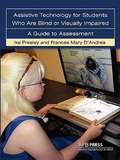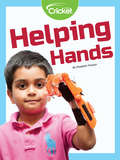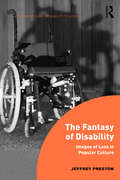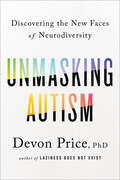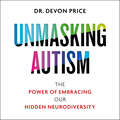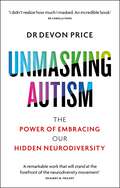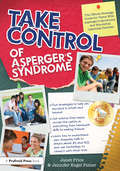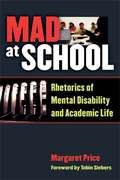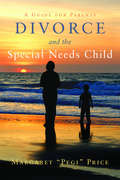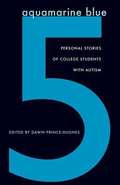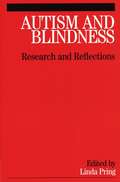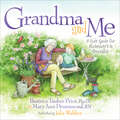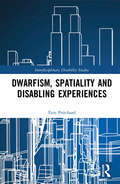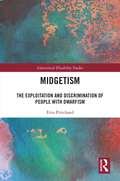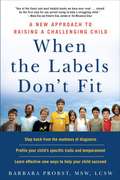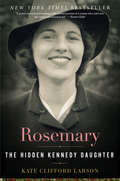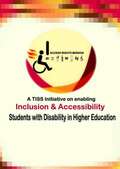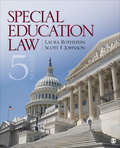- Table View
- List View
Daniel's Music: One Family's Journey from Tragedy to Empowerment Through Faith, Medicine, and the Healing Power of Music
by Jerome Preisler The Trush FamilyIn 1997, Daniel Trush, a bright, active, outgoing twelve-year-old, collapsed on the basketball court and fell into a deep coma. Rushed to the hospital, he was found to have five previously undetected aneurysms in his brain. One had burst, causing a massive cerebral hemorrhage.While Daniel remained comatose, the uncontrolled pressure inside his skull caused him to suffer multiple strokes. Tests showed that his brain functions had flat-lined, and doctors would soon tell his parents his chances of survival were slim to none--or that he'd likely remain in a vegetative state if he awakened.But the doctors were wrong.Daniel's traumatic injury did not bring his life to a premature end. Thirty days after lapsing into a coma, he would return to consciousness, barely able to blink or smile. Two years later, he took his first extraordinary steps out of a wheelchair. A decade after being sped to the emergency room, Daniel Trush completed the New York Marathon.But his incredible journey into the future had just begun. With music having played a crucial role in his recovery, Danny and his family launched Daniel's Music Foundation, a groundbreaking nonprofit organization for people with disabilities. In time DMF would be honored on a Broadway stage by the New York Yankees, gaining notoriety and admiration across America.Daniel's Music is the gripping story of Daniel's recovery against odds experts said were insurmountable; of medical science, faith, and perseverance combining for a miracle; and of an average family turning their personal trials into a force that brings joy, inspiration, and a powerful sense of belonging to all those whose lives they touch.
Treatment of Autism Spectrum Disorders: Evidence-Based Intervention Strategies for Communication and Social Interactions
by Patricia A. Prelock Rebecca J. MccauleyThe authors aim to make the research and clinical literature on ASD (Autism Spectrum Disorders), accessible to a wide range of audiences -- parents and families of children with ASDs, frontline professionals and students, and professors who study ASDs.
Rangbhoomi
by PremchandA well crafted Novel with a blind man as the protagonist. The novelist depicts the whole society around him. The story revolves around the peasant society of Indian villages. Premchand treads the very tricky ground of tensions between the rulers and the ruled in this novel. Dialogues between the characters are as real as life and relevant till date in India.
Leveling the Playing Field: Improving Technology Access and Design for People with Intellectual Disabilities
by Presidents Committee for People w/Intellectual DisabilitiesThe President's Committee for People with Intellectual Disabilities is honored to advise the President and the Secretary of Health and Human Services about the role of technology in improving the quality of life for people with ID and ensuring their full citizenship rights. A new generation of technologies continues to redefine, at an accelerated pace, how we all live, grow, and excel. The same should be true for people with ID. Access to technology is critical for people with ID to fully engage in the everyday life of our society.
Assistive Technology For Students Who Are Blind or Visually Impaired: A Guide to Assessment
by Ike Presley Frances Mary D'AndreaAssistive technology is essential in todays world to enable people who are blind or visually impaired to participate fully in school, work, and life. But which assistive technology tools are right for your students? This comprehensive handbook is the essential resource for teachers of students with visual impairments, administrators, technology professionals, and anyone who needs to keep up with the ever-changing world of technology. Assistive Technology For Students Who Are Blind or Visually Impaired: A Guide to Assessment contains a wealth of technical information translated into clear, user-friendly terms, including: An overview of the full range of assistive technology that students can use to manage information in print or electronic formats-whether they use vision, touch or hearing to access information How to select appropriate tools and strategies A structured process for conducting a technology assessment Detailed assessment forms that can be used to determine students technology needs and solutions to address them Advice on writing up program recommendations based on assessment results Reproducible, blank assessment forms
Helping Hands
by Elizabeth PrestonSome kids are born missing a hand or fingers, others lose them because of accidents. Find out how people are printing artificial hands on 3-D printers to help those who need a hand. They are cheap, easy to build, and really work!
The Fantasy of Disability: Images of Loss in Popular Culture (Interdisciplinary Disability Studies)
by Jeffrey PrestonWhat are the unconscious fantasies circulating in representations of disability? What role do these fantasies play in defining the condition of disability? What can these fantasies teach us about human vulnerability writ large? The Fantasy of Disability explores how popular culture texts, such as Degrassi: The Next Generation and Glee, fantasize about what life with a physical disability must be like, while at the same time exerting tremendous pressure on disabled individuals to conform their identity and behaviour to fit within the margins of these societally perpetuated archetypes. Rather than merely engaging with how disability is represented, though, this text investigates how representations of disability reveal their nondisabled producers to be perpetually anxious subjects, doomed to fear not just the disabled subject but the very reality of disability lurking within. Situated at the nexus of disability studies, media studies and psychology, this text presents an innovative way of analyzing representations of disability in popular culture, inverting the psychoanalytic gaze back upon the nondisabled to investigate how disability can become a lens through which to interrogate the normate subject.
Unmasking Autism: Discovering the New Faces of Neurodiversity
by Devon PriceA deep dive into the spectrum of Autistic experience and the phenomenon of masked Autism, giving individuals the tools to safely uncover their true selves while broadening society&’s narrow understanding of neurodiversity&“A remarkable work that will stand at the forefront of the neurodiversity movement.&”—Barry M. Prizant, PhD, CCC-SLP, author of Uniquely Human: A Different Way of Seeing AutismFor every visibly Autistic person you meet, there are countless &“masked&” Autistic people who pass as neurotypical. Masking is a common coping mechanism in which Autistic people hide their identifiably Autistic traits in order to fit in with societal norms, adopting a superficial personality at the expense of their mental health. This can include suppressing harmless stims, papering over communication challenges by presenting as unassuming and mild-mannered, and forcing themselves into situations that cause severe anxiety, all so they aren&’t seen as needy or &“odd.&” In Unmasking Autism, Dr. Devon Price shares his personal experience with masking and blends history, social science research, prescriptions, and personal profiles to tell a story of neurodivergence that has thus far been dominated by those on the outside looking in. For Dr. Price and many others, Autism is a deep source of uniqueness and beauty. Unfortunately, living in a neurotypical world means it can also be a source of incredible alienation and pain. Most masked Autistic individuals struggle for decades before discovering who they truly are. They are also more likely to be marginalized in terms of race, gender, sexual orientation, class, and other factors, which contributes to their suffering and invisibility. Dr. Price lays the groundwork for unmasking and offers exercises that encourage self-expression, including:• Celebrating special interests• Cultivating Autistic relationships• Reframing Autistic stereotypes• And rediscovering your valuesIt&’s time to honor the needs, diversity, and unique strengths of Autistic people so that they no longer have to mask—and it&’s time for greater public acceptance and accommodation of difference. In embracing neurodiversity, we can all reap the rewards of nonconformity and learn to live authentically, Autistic and neurotypical people alike.
Unmasking Autism: The Power of Embracing Our Hidden Neurodiversity
by Devon Price'Reading this felt like being at home - I didn't realise how much I masked. What an incredible book that I know will be re-read many times over.' - Dr Camilla Pang, author of Explaining Humans'Unmasking Autism is at once a most deeply personal and scholarly account of the damage caused by autistic (and all) people leading masked lives, and how unmasking is essential to creating a self-determined, authentic life... This is a remarkable work that will stand at the forefront of the neurodiversity movement.' - Dr Barry M. Prizant, author of Uniquely Human'A powerful argument for radical self-acceptance applicable to all readers.' - Los Angeles Times'An essential roadmap for autistic people to be themselves.' - NPR'Price's accessible and compassionate writing shines, and readers will feel encouraged to embrace a new understanding of themselves. Its potential to help masked autistic adults, especially those from systemically marginalized backgrounds, makes this book essential for most collections.' - Library Journal (starred review)Have you, a friend or family member been living with undiagnosed autism?For every visibly Autistic person you meet, there are countless 'masked' people who pass as neurotypical. They don't fit the stereotypical mould of Autism and are often forced by necessity to mask who they are, spending their entire lives trying to hide their Autistic traits. In particular, there is evidence that Autism remains significantly undiagnosed in women, people of colour, trans and gender non-conforming people, many of whom are only now starting to recognise those traits later in life.Blending cutting-edge research, personal insights and practical exercises for self-expression, Dr Devon Price examines the phenomenon of 'masking', making a passionate argument for radical authenticity and non-conformity. A powerful call for change, Unmasking Autism gifts its readers with the tools to uncover their true selves and build a new society - one where everyone can thrive on their own terms.
Unmasking Autism: The Power of Embracing Our Hidden Neurodiversity
by Devon Price'Reading this felt like being at home - I didn't realise how much I masked. What an incredible book that I know will be re-read many times over.' - Dr Camilla Pang, author of Explaining Humans'Unmasking Autism is at once a most deeply personal and scholarly account of the damage caused by autistic (and all) people leading masked lives, and how unmasking is essential to creating a self-determined, authentic life... This is a remarkable work that will stand at the forefront of the neurodiversity movement.' - Dr Barry M. Prizant, author of Uniquely Human'A powerful argument for radical self-acceptance applicable to all readers.' - Los Angeles Times'An essential roadmap for autistic people to be themselves.' - NPR'Price's accessible and compassionate writing shines, and readers will feel encouraged to embrace a new understanding of themselves. Its potential to help masked autistic adults, especially those from systemically marginalized backgrounds, makes this book essential for most collections.' - Library Journal (starred review)Have you, a friend or family member been living with undiagnosed autism?For every visibly Autistic person you meet, there are countless 'masked' people who pass as neurotypical. They don't fit the stereotypical mould of Autism and are often forced by necessity to mask who they are, spending their entire lives trying to hide their Autistic traits. In particular, there is evidence that Autism remains significantly undiagnosed in women, people of colour, trans and gender non-conforming people, many of whom are only now starting to recognise those traits later in life.Blending cutting-edge research, personal insights and practical exercises for self-expression, Dr Devon Price examines the phenomenon of 'masking', making a passionate argument for radical authenticity and non-conformity. A powerful call for change, Unmasking Autism gifts its readers with the tools to uncover their true selves and build a new society - one where everyone can thrive on their own terms.
Take Control of Asperger's Syndrome: The Official Strategy Guide for Teens With Asperger's Syndrome and Nonverbal Learning Disorder
by Janet Price Jennifer Engel FisherA gifted education Legacy Award winner, Take Control of Asperger's Syndrome: The Official Strategy Guide for Teens With Asperger's Syndrome and Nonverbal Learning Disorder is a unique handbook for kids and teens on living successful lives with these disorders by taking control of their strengths to overcome their weaknesses.Drawing on their experiences as parents and teachers of students with Asperger's syndrome (AS) and Nonverbal Learning Disorder (NLD), the authors provide tips on understanding the disorders, living with the symptoms, succeeding in school, completing homework, talking to others about strengths and needs, making friends and socializing, and using technology to connect with other kids and teens with these disorders.By interviewing dozens of kids and teens who live with AS and NLD, the authors include ideas, information, and advice for students, by students just like them. This handy guidebook is sure to help any child or teen with AS or NLD navigate life's challenges with successful outcomes.Named one of the Pennsylvania State Librarians Assoication's Young Adult Top Forty nonfiction books of 2010.Ages 10-16
Mad at School: Rhetorics of Mental Disability and Academic Life
by Margaret PriceMad at School explores the contested boundaries between disability, illness, and mental illness in the setting of U.S. higher education. Much of the research and teaching within disability studies assumes a disabled body but a rational and energetic (an 'agile') mind. In Mad at School, scholar and disabilities activist Margaret Price asks: How might our education practices change if we understood disability to incorporate the disabled mind?
A Guide for Parents Divorce and the Special Needs Child
by Margaret Pegi" PriceGoing through a divorce is always tough, but when a child with special needs is involved it can be especially challenging. This book takes a clear and comprehensive look at every aspect of the legal divorce process, and addresses all of the legal issues that divorcing parents of children with special needs face. The author guides parents through the initial hurdles of choosing the right lawyer for their case, and explains exactly how to work with them to achieve the best possible outcome for all concerned. From agreeing upon child custody arrangements that meet the particular needs of the child, to making provision for child support payments, gathering together the documentation needed to prove a case, and dealing with financial issues such as debts and property distribution, no aspect of divorce is left uncovered. A set of checklists is included to ensure that parents consider everything they need to, and the book concludes with a useful list of further resources. Written by an experienced family lawyer who went through her own divorce when her son, who has autism, was six, this book offers much-needed guidance to divorcing parents of children with a variety of special needs.
Absent Citizens
by Michael J. PrinceDisability exists in the shadows of public awareness and at the periphery of policy making. People with disabilities are, in many respects, missing from the theories and practices of social rights, political participation, employment, and civic membership. Absent Citizens brings to light these chronic deficiencies in Canadian society and emphasizes the effects that these omissions have on the lives of citizens with disabilities.Drawing together elements from feminist studies, political science, public administration, sociology, and urban studies, Michael J. Prince examines mechanisms of exclusion and inclusion, public attitudes on disability, and policy-making processes in the context of disability. Absent Citizens also considers social activism and civic engagements by people with disabilities and disability community organizations, highlighting presence rather than absence and advocating both inquiry and action to ameliorate the marginalization of an often overlooked segment of the Canadian population.
Aquamarine Blue 5: Personal Stories of College Students With Autism
by Dawn Prince-HughesThe first book to be written by autistic college students who have been diagnosed with Asperger's Syndrome, or High Functioning Autism, Aquamarine Blue 5 demonstrates their unique way of looking at and solving problems and the challenges they face. These readable essays detail the struggles of a highly sensitive group and show that there are gifts specific to autistic students that enrich the university system, scholarship, and the world as a whole. Containing the stories of a dozen autistic students, the book deals with everything from learning to eat in dormitory dining halls to making friends to exploring sexuality.
Autism and Blindness: Research and Reflections
by Linda PringThis book has brought together leading international experts to explore the similarities and the differences between autism and blindness. Current research with children as well as adults is described comparing early psychological development from a range of perspectives such as language, memory, thought and feelings as well as providing critical reviews of educational and intervention programmes. New developments in the field have sparked debate that is well represented here and touches on a variety of issues ranging from musical talent to the basis of 'connectedness' to others. The readership will be drawn from many fields reflecting the interdisciplinary nature of the topic and will include researchers and practitioners in psychology and psychiatry as well as educationalists, therapists, classroom teachers and parents.
Grandma and Me: A Kid's Guide for Alzheimer's & Dementia
by Beatrice Tauber Prior Mary Ann DrummondA beautiful storybook that helps children understand their grandparent&’s challenges, written by a nurse and a psychologist. The authors of Grandma and Me have combined their years of clinical experience to create a truly engaging, yet informative book for young children on the topics of Alzheimer&’s and dementia. With beautiful artwork to capture children&’s attention, Grandma and Me provides a gentle, age-appropriate portrait of Alzheimer&’s disease in the context of a loving relationship between grandparent and grandchild—and provides tools that will help children continue to have a relationship with their loved one despite the disease. Grandma and Me addresses a difficult topic with compassion and understanding, and allows families to successfully navigate the journey ahead.
Dwarfism, Spatiality and Disabling Experiences (Interdisciplinary Disability Studies)
by Erin PritchardThis book provides an in-depth analysis of the social and spatial experiences of people with dwarfism, an impairment that results in a person being no taller than 4ft 10. This book engages with the concept that dwarfism’s most prominent feature – body size and shape – can form the basis of social discrimination and disadvantages within society. By ignoring body size as a disability, it is hard to see the resulting disabling consequences of the built environment. Using a mixed-methods approach and drawing on the work undertaken by human geographers and disability studies academics, this book analyses how the relationship between harmful cultural stereotypes and space shapes everyday experiences of people with dwarfism and works to socially exclude them in diverse ways. Showing how spatial and social barriers are not mutually exclusive but can influence one another, this book responds to the limited academic work on the subject of dwarfism, whilst also contributing to the study of geographies of body size. It will be of interest to all scholars and students of disability studies, human geography, the built environment, sociology and medical humanities.
Midgetism: The Exploitation and Discrimination of People with Dwarfism (Autocritical Disability Studies)
by Erin PritchardThere exist problematic attitudes and beliefs about dwarfism that have rarely been challenged, but continue to construct people with dwarfism as an inferior group within society. This book introduces the critical term ‘midgetism’, which the author has coined, to demonstrate that the socio-cultural discrimination people with dwarfism experience is influenced by both heightism and disablism. As a result, it unpacks and challenges the problematic social assumptions that reinforce midgetism within society, including the acceptability of ‘midget entertainment’ and ‘non-normate space’, to demonstrate how particular spaces can either aid in reinforcing or challenge midgetism. Drawing on the tripartite model of disability, this book demonstrates how midget entertainment is framed as a non-normative positivism, which makes it an acceptable form of employment. Using autocritical discourse analysis, the book exposes, examines and responds to excuses that are used to reinforce midgetism, thus critiquing the numerous beliefs influenced by cultural representations of dwarfism, such as people with dwarfism being acceptable figures of entertainment. It will be of interest to all scholars and students of disability studies, social history, sociology and cultural geography.
When the Labels Don't Fit: A New Approach to Raising a Challenging Child
by Barbara Probst"One of the finest and most helpful books we have ever read ... should be the first stop for any parent trying to help a struggling child. " --Brock Eide and Fernette Eide, authors of The Mislabeled Child. Finally, a positive approach designed around your child's traits and needs. Many children do things that seem odd, troubling, or excessive at some point in their development, and our culture is quick to attach a label to every child who's "outside the box" or hard to raise. Again and again, studies document the explosion in the number of children receiving psychiatric diagnoses for being intense, moody, or offbeat. In this groundbreaking book, childhood development expert Barbara Probst provides a new framework for identifying the specific traits--like rigidity, curiosity, perfectionism, intensity, slow tempo, a need for novelty, or a need for control--that lie at the root of your child's challenging behavior. When the Labels Don't Fit features a questionnaire for profiling your child's temperament and more than sixty strategies for dealing with specific kinds of behavior. It's the first comprehensive system that's not based on figuring out what's "wrong" with your child, but on helping you tap into your child's strengths so you can manage, nurture, and enjoy his or her essential nature.
Divyangoni Duniya: દિવ્યાંગોની દુનિયા
by Prof. Dr. Ashwin Jansariઆ પુસ્તક નો હેતુ દિવ્યાંગ બાળકો અને વ્યક્તિઓની મુશ્કેલીઓ અને સમસ્યાઓ અંગે જાણકારી મેળવવાનો છે. તેઓ કેવી રીતે સમાયોજન મેળવી શકે, વિવિધ યોજનાઓ અને અન્ય બાબતો અંગેના લેખો દ્વારા જાણવા મળે છે.
Rosemary: The Hidden Kennedy Daughter
by Prof. Kate Clifford LarsonThey were the most prominent American family of the twentieth century. The daughter they secreted away made all the difference.<P><P> Joe and Rose Kennedy's strikingly beautiful daughter Rosemary attended exclusive schools, was presented as a debutante to the Queen of England, and traveled the world with her high-spirited sisters. And yet, Rosemary was intellectually disabled -- a secret fiercely guarded by her powerful and glamorous family. Major new sources -- Rose Kennedy's diaries and correspondence, school and doctors' letters, and exclusive family interviews -- bring Rosemary alive as a girl adored but left far behind by her competitive siblings. Kate Larson reveals both the sensitive care Rose and Joe gave to Rosemary and then -- as the family's standing reached an apex -- the often desperate and duplicitous arrangements the Kennedys made to keep her away from home as she became increasingly intractable in her early twenties. Finally, Larson illuminates Joe's decision to have Rosemary lobotomized at age twenty-three, and the family's complicity in keeping the secret. Rosemary delivers a profoundly moving coda: JFK visited Rosemary for the first time while campaigning in the Midwest; she had been living isolated in a Wisconsin institution for nearly twenty years. Only then did the siblings understand what had happened to Rosemary and bring her home for loving family visits. It was a reckoning that inspired them to direct attention to the plight of the disabled, transforming the lives of millions.
A TISS Initiative on enabling Inclusion and Accessibility for Students with Disability in Higher Education
by Prof S. Parasuraman Dr. Vaishali KolheThe "I Access Rights Mission" (IARM) is an innovative initiative by Tata Institute of Social Sciences (TISS) and Centre for Disability Studies + Action (CDSA) to promote inclusion and accessibility for students with disabilities in higher education. By implementing a rights-based framework, involving stakeholders and utilizing international and national protocols, IARM aims to create an inclusive learning environment that addresses individual needs, eliminates barriers, and fosters mutual confidence. Through a cultural shift towards acceptance and diversity, IARM seeks to empower students with disabilities to become active participants in education and society, ensuring equal opportunities and rights for all.
Special Education Law
by Professor Laura F. Rothstein Scott F. JohnsonSpecial Education Law, Fifth Edition provides a comprehensive, and student-friendly overview of the major federal laws—and judicial interpretations of those laws—that apply to the education of children with special needs. Laura Rothstein and Scott F. Johnson thoroughly present the most up-to-date information on special education statutes, regulations, and judicial interpretations, including substantial changes in the interpretation of the legistlation. The text helps students understand what the law requires so that they can develop policies and make decisions that comply with these laws.
